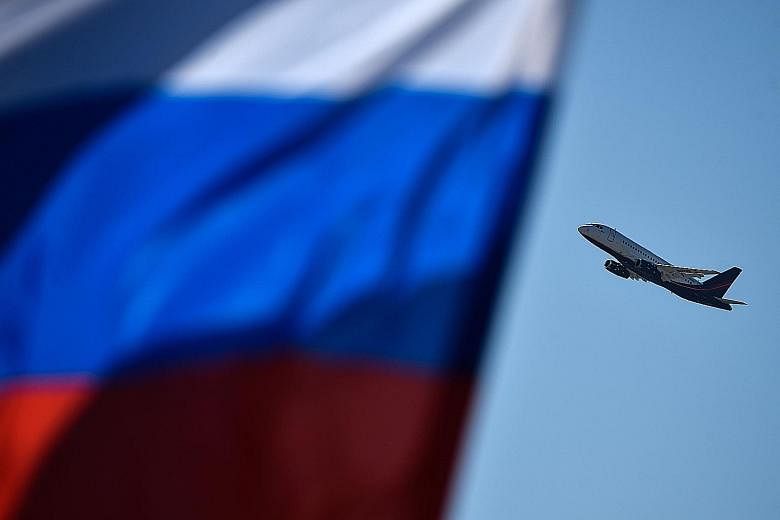MOSCOW • Across Russia, companies are being forced to prioritise patriotism over profits.
To help support home-grown companies in the midst of a downturn and Western sanctions, the government is pushing the national flag carrier Aeroflot to buy the new Russian Superjets by Sukhoi - a manufacturer best known for rolling out the fighters and bombers now streaking over Syria.
Aeroflot must make the shift without spooking its customers at a time when Russia's airline sector is facing pressures not only from a sharp recession, but also from safety jitters over the crash in Egypt of a Russian passenger jet made by Airbus. Aeroflot stopped buying Russian-made jets years ago over safety lapses.
In the energy sector, as oil prices slump, giants like Gazprom are facing the possibility of higher taxes. The added cost would cut into the dividends available to investors, many of which are big Western mutual fund managers.
And worried about unemployment and political unrest, the government pushed back when Avtovaz, the maker of Lada cars, moved quickly to cut workers as the economy slowed. To save money, the company instead announced a lengthy Christmas holiday, from Dec 18 until Jan 17.
In recent years, Aeroflot, which is 51 per cent state-owned, has overcome its reputation for abrasive service, poor safety and weak financial returns. Since the turnaround, the airline has come to be considered one of the country's corporate champions. But that lofty position now means the Russian government is turning to Aeroflot for help.
Aeroflot, which flies 118 Airbuses and 25 Boeings, has 21 Sukhoi Superjets in its fleet. An additional 29 Superjets are on order. Judging by passenger chatter, the squat, chubby Superjet is not many travellers' first choice. "An idiotic plane," one customer wrote on Aeroflot's website after taking a flight on the Superjet. "For me, all routes this tub flies are off limits. Once was enough."
As the Kremlin has taken a more hands-on role in the downturn, investors have reassessed their thinking on Russian businesses once considered emerging-market darlings. Shares in the MSCI Russia Index are now trading at a minuscule 5.4 price-to-earnings ratio, a common gauge of investor confidence in future profits. By comparison, the price-earnings ratio on the broad MSCI emerging market index is 11.1.
"Clearly, this is one reason the Russian market is very cheap," Mr Daniel Salter, head of equity strategy at Renaissance Capital, an investment bank, said of government pressure on businesses. "Investors are well aware of that kind of risk."
Aeroflot is dealing with a long list of government demands. Along with buying Russian-made planes, Aeroflot stepped in this fall to fly passengers stranded by the bankruptcy of its largest rival, Transaero.
Aeroflot is also being pressured by the government to fly unprofitable routes to far-flung Siberian cities, so people in these places have at least some means of transportation. The company receives state subsidies for ticket sales to certain destinations.
Even in Russia, the Superjet remains a rarity for now. Sukhoi says about 66 planes are in operation.
Even with the added obligations, Aeroflot is still reporting operating profits, albeit a net loss overall. "Every big company carries out activities to show it is acting responsibly towards the people it serves, and we do this, too," said an Aeroflot spokesman.
NEW YORK TIMES

